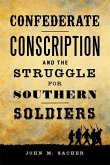"William Marvel's "Rebel Resurrection" examines a dozen mostly small and largely understudied Confederate and Union military operations in early 1864 that, when combined, represented a unique and unbroken string of successes for the demoralized Confederacy. Dejection and despair were the prevailing sentiments as 1863 ended, with the Confederate nation cut in two, Tennessee lost completely, Braxton Bragg's army utterly routed at Chattanooga, and even the no-longer-invulnerable Robert E. Lee defeated at Gettysburg. The early 1864 victories gave the Confederacy hope of turning the tide of its misfortunes, giving it the will to fight on in its doomed effort to preserve slavery by seceding from the United States. Surprisingly, the cumulative result of the campaigns has remained virtually unnoticed and until now has never been examined in detail. The operations Marvel examines include William T. Sherman's Meridian campaign; Pickett's failed attack on New Bern; the sinking of the USS Housatonic by the CSS Hunley; the Confederate victory at Olustee, Florida; Nathan Bedford Forrest's defeat of William Sooy Smith's cavalry raid; the repulse of the Union advance on Dalton, Georgia; Ben Butler's botched raid on Richmond; Judson Kilpatrick's equally disastrous reprise of the same effort; the ill-fated Red River campaign; Forrest's raids on Union City, Paducah, and Fort Pillow; the failed Camden expedition into Arkansas; and the capture of Plymouth, North Carolina and its Union garrison. Those real and perceived Confederate successes emanated from Union army operations that ranged between unnecessary and inadvisable, and their principal fruits consisted of a vibrant restoration of Confederate hope and confidence in camp and at home. Overall, Marvel suggests that the operations worked disproportionate magic on all the major armies of the South by the opening of the spring campaigns of 1864, illustrating how abruptly dismal military prospects could be reversed. He contends that without that experience to sustain them, the Confederates who faced Sherman and Grant in the spring and summer of 1864 would inevitably have shown less âelan and ferocity at the outset of those campaigns and would have been more readily susceptible to the demoralization that ultimately led to the collapse of the rebellion. Marvel's study offers a smorgasbord for readers interested in military aspects of the Civil War. In addition, it also explains the remarkable recovery of confidence in the Confederate army and on the home front between the winter and spring of 1864"--
Hinweis: Dieser Artikel kann nur an eine deutsche Lieferadresse ausgeliefert werden.
Hinweis: Dieser Artikel kann nur an eine deutsche Lieferadresse ausgeliefert werden.








